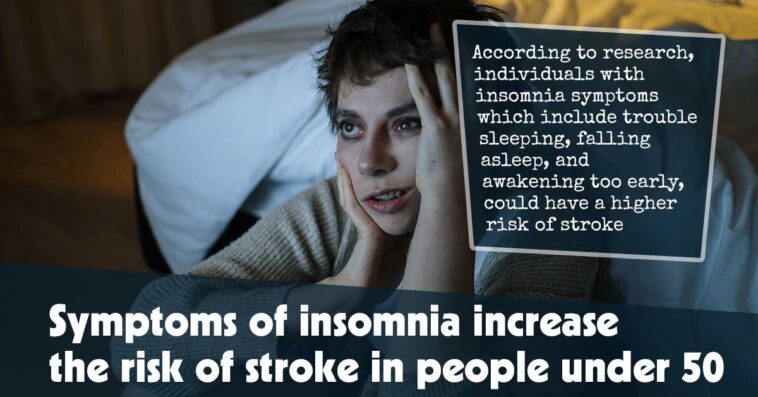Insomnia Symptoms Raise Stroke Risk in Individuals Under 50
Research suggests that individuals who have insomnia symptoms, such as difficulty falling asleep and waking up too early, may be at a greater risk of stroke.
The study revealed that stroke risk is much higher among individuals under 50. The study does not prove that insomnia symptoms lead to stroke, but it shows a link.
Sleep problems can be treated with a variety of behavioral or medical treatments. This could reduce stroke risk in later life.
The study involved 31,126 participants with an average age of 61. The participants had no history of stroke at the time they began the study.
Four questions were asked to the participants regarding their sleep problems. These included difficulty falling asleep, difficulty waking during the night, and difficulties waking too early.
The options for the response were most of the time or rarely or never. The scores ranged between 0 and 8, with higher scores indicating more severe symptoms of insomnia.
In average, the individuals were observed for nine years. Over the course of that period, 2,101 cases of stroke were reported.
After other factors that may impact stroke risk were taken into account, such as alcohol consumption, smoking and physical activity, individuals with 1-4 symptoms of sleeplessness had a higher stroke risk than those without any insomnia symptoms.
One hundred and thirty strokes were experienced by the 19149 people with one to four symptoms of insomnia. From the 6,282 people without any insomnia symptoms, 365 had a stroke. The risk of stroke was 51% greater for individuals with 5-8 insomnia symptoms. Out of the 5,695 people with 5 to 8 insomnia symptoms, 436 had a stroke.
The risk of stroke is almost four times higher for individuals who have 5 to 8 symptoms compared to those without symptoms.
27 of the 458 people under 50 years old with 5-8 symptoms of insomnia suffered a stroke. The risk of stroke for individuals aged 50 and older with the same number of symptoms as those without insomnia symptoms was 38% higher. 33 strokes were experienced by 654 people 50 years and older who had 5 to 8 symptoms.
The increased stroke incidence as we age could explain the difference in risk between these two age groups. As we age, the list of stroke risk factors can include diabetes and hypertension. Insomnia symptoms is one of many possible factors.
This difference suggests that treating insomnia symptoms when young could be a good way to prevent stroke. The relationship was stronger for those with diabetes, depression, high blood-pressure, and heart disease.
The study was limited by the fact that insomnia symptoms had to be self-reported. This could have led to inaccurate information.
